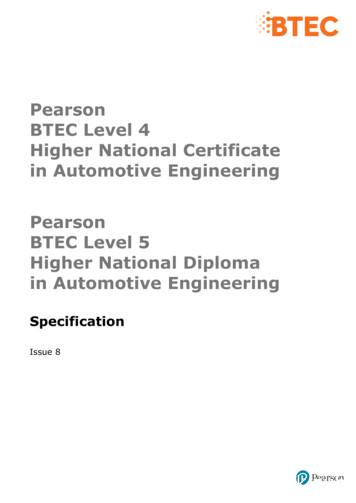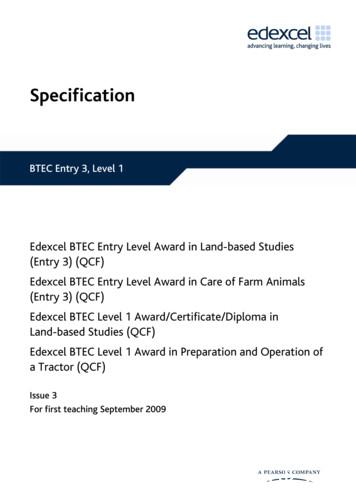BTEC Level 2 - East Riding College
BTEC Level 2Information and Creative Technology1 year course
Choosing to study towards a BTEC Level 2in Information and Creative Technology isa great decision to make for lots ofreasons:-Why choose thiscourse ?. You will learn about the online worldand technology systems You will develop skills to create andwork with digital assets such asaudio and graphics Plus you will have the opportunity todevelop apps and work with othersoftware.
This qualification will help tomake you technology savvyWhat can I gainfrom studying thiscourse and wherecan it take me . Equip you with the skills valuedby employers in any career youwish to pursue, but willparticularly prepare you for acareer using ICT. It will, also help you to progressto the next level of study –Level 3
So what will I study? You will also: Undertake some work Experience Participate in Enrichment andEnterprise activitiesUnit 1Unit 2Unit 3The OnlineWorldTechnologySystemsA Digital PortfolioUnit 6Unit 9Unit 10Creating opmentUnit 11Unit 12Unit pment
Unit 1 – The Online World This unit answers the many questions . How do websites work? How do emails get to your computer? How does the use of computer applications affect your dailylife? How does online storage work? What is collaborative software and how and when is it used. How you conduct effective internet searches and how do IblogYou will look at a range of devices, including smartphones and digitalmusic players, and investigate a range technologies that enablesyour digital devices to share and exchange information. As well as looking at the next phase of the internet revolution And not forgetting security and privacy concerns andconsiderations
Unit 2 – Technology Systems Technology systems are involved in many for the objectswe use every day, from laptop computers to smartphones. In this unit you will first look at how the main buildingblocks of technology systems work and how they worktogether You will also learn how data flows between internalcomponents of a computer and how it is processed toprovide information And find out more about the different types of software.
Unit 3 – A Digital Portfolio This is an exciting unit were you will learn how todesign, create and test your own digital portfolio,allowing you to be creative and imaginative. Digital portfolios come in many forms, depending onthe information that they contain. For example a digital portfolio could be created tohelp support an application for a job, or it could becreated for an estate agent to showcase theirproperties for sale.
Unit 6 – Creating Digital Graphics Digital graphics are images and/or text created on orscanned into a computer. Graphics are used to communicate messages in everypart of our lives, including advertising, music, fashion,interior design and architecture. You see graphic when you surf websites, playcomputer games or go shopping Graphics bring colour, information and interest to ourlives. You will learn when and where graphics are used, aswell as the opportunity to design, create and test adigital graphic product of your own.
Unit 9 – Spreadsheet Development Numbers are part of our daily lives, you will need to beable to handle them, whether you are doing homework,working out home finances or running a business. In this unit you will learn about: The different uses of spreadsheets The different features available in spreadsheet packages We will teach you how to use and understand spreadsheetpackages And then you will: Design, develop and test a spreadsheet for a specificpurpose
Unit 10 – Database Development Most people who use computers at work will probablyuse databases on a regular basis. In most situations, users will be interacting with anexisting database. For example to add and amendrecords, to search for information or to produce reports,some users will need to be able to design and crate adatabase. This unit covers the knowledge and skillsneeded to do this. You will learn about the different uses and tools andtechniques used in databases You will design, create and test a database for a specificpurpose.
Unit 11 – Computer Networks Networks are around us and are a major part ofour lives. We all use networks every day in may ways,particularly to send email, browse the internet,play online games watch on-demand TV and tohelp us work. You will learn the features and uses of computernetworking And then, Create, develop and test a computer network tofulfil your design using hardware and softwarecomponents that you configure according to yourdesign documentation.
Unit 12 – Software Development This unit will teach you what is meant by software development.Have you ever wondered how they can make your computer orhandheld device behave in such different ways? Software development or computer programming is not aboutbuilding computers or operating them, but is about giving thecomputer system a set of instructions that will tell it to carry outactions. You will learn about the characteristics and uses of differentsoftware programs. Then get hands on experience of designing, developing, testingand then reviewing your finished software program.
Unit 13 – Website Development Most of us use the internet every day and visit a wholerange of websites in order to do business, to find outinformation, for entertainment and to keep in touch withfriends. Many of these websites are visually stimulating, containingmany different elements, such as text, graphics, animation,video and programs as well as a number of sophisticatedinteractive features. This unit will teach you the uses and features of websites Then you will be given the opportunity to design, develop,test and review a website.
How will I be assessed? You will be assessed in two different ways For most units, your tutor will set assignments for you tocomplete. They make take the form of projects where youresearch, plan, prepare and evaluate a piece of work oractivity. The other units will be assessed by an online exam – don’tworry your tutor will make sure that you are fully preparedfor the exam. These online exams will consist of different types ofquestions – it could be multiple choice questions orquestions which you need to give a short answer to.
How can I be successful on this course? The college and your tutors will help and support youthroughout your time at college: You will attend an induction to the course and the college inthe first week of your study. You will have a weekly tutorial sessions, with guest speakersand one-to-one tutorials to manage and monitor your needsand your progress. Your course tutor and you will regularly meet to set andreview targets and goals for you to work to You will have access both at college and at home or on yourmobile phone to college resources on Teams You will be given a college email to contact and be contactby your tutors.
What can I do to help myself succeed ? We ask that you: Attend all your timetabled sessions Be punctual Bring the right equipment to class Notify your tutor if you cannot come into college for anyreason Talk to your tutor regularly Abide by College policies and guidelines
What and why do I have to do workexperience? All our learners are expected to undertake around 30hours of work experience during the year. We will help you to create and produce a CV which youcan use to find valuable work experience. Work experience will help you to improve and developpersonal and transferable skills. You can add the work experience to your CV too.
What is Enterprise? We expect all of our learners to participate and undertake intheir tutor group an enterprising activity. An enterprising activity could be or involve for examples: Raising money and awareness for a charitable cause Doing something for others without the expectation of arewards It is up to your tutor group to come up with an idea, plan it,and then do it. This can be very rewarding and again it is something thatcan be put onto your CV.
BTEC Level 2 Information and Creative Technology. 1 year course. Why choose this course ?. Choosing to study towards a BTEC Level 2 in Information and Creative Technology is a great decision to make for lots of reasons:- You will learn about the online world and technology systems You will develop skills to create and work with digital assets such as audio and graphics Plus. you .
Pearson BTEC Level 4 HNC The Pearson BTEC Level 4 HNC in Business is a qualification with a minimum of 120 credits of which 60 are mandatory core. The Pearson BTEC Level 4 HNC programme must contain a minimum of 65 credits at level 4. Pearson BTEC Level 5 HND The Pearson BTEC Lev
BTEC Level 4 HNC The Pearson BTEC Level 4 HNC in Business (QCF) is a qualification with a minimum of 120 credits of which 60 are mandatory core. The BTEC Level 4 HNC programme must contain a minimum of 65 credits at level 4. BTEC Level 5 HND The Pearson BTEC Level 5 HND in Business (QCF) is a qualification with a
BTEC Entry Level (E1, E2, E3) BTEC Level 1 (QCF) expectations for your centre. PSD, Workskills (Level 1 & 2) Life Skills years).BTEC Specialist (Level 1-3)* BTEC Professional (Level 4-7)* BTEC qualification Internal ungraded unit (‘Pass/fail’) We reviewed the information you submitted to us (actual unit grades and CAG) against our
Pearson BTEC Level 4 HNC Diploma in Automotive Engineering Pearson BTEC Level 5 HND Diploma in Automotive Engineering The BTEC HNCs (Higher National Certificates) are now at level 4 and are a minimum of 120 credits in size. They have been nested within the structures of the BTEC HNDs (Higher National Diplomas). BTEC HNDs are level 5 qualifications.
Technology Pearson BTEC Level 3 National Foundation Diploma in Information Technology First teaching 2016 Pearson BTEC Level 3 National Diploma (2017) in Information Technology Pearson BTEC Level 3 National Extended Diploma (2017) in Information Technology First teaching 2017 . Edexcel, BTEC and LCCI qualifications Edexcel, BTEC and LCCI qualifications are awarded by Pearson, the UK’s .
Qualification sizes for BTEC Firsts in the Business sector 6 3 Pearson BTEC Level 1/Level 2 First Diploma in Business 9 Rationale for the Pearson BTEC Level 1/Level 2 First Diploma in Business 9 4 Qualification structure 14 Qualification structure of the Pearson BTEC Level 1/Level 2 First Diplom
Edexcel BTEC Entry Level Award in Care of Farm Animals (Entry 3) (QCF) Edexcel BTEC Level 1 Award/Certificate/Diploma in Land-based Studies (QCF) Edexcel BTEC Level 1 Award in Preparation and Operation of a Tractor (QCF) Issue 3 For first teaching September 2009 BTEC Entry 3, Level 1
BTEC ENGINEERING UNITS: The BTEC Level 3 Extended Diploma [1080 glh] is equivalent in size to 3 A levels. The BTEC Level 3 National Diploma [720 glh] is equivalent in size to 2 A levels. The BTEC Level 3 National Extended Certificate [36 glh] is equivalent in size to A level. All units have a point’s value and to achieve






















